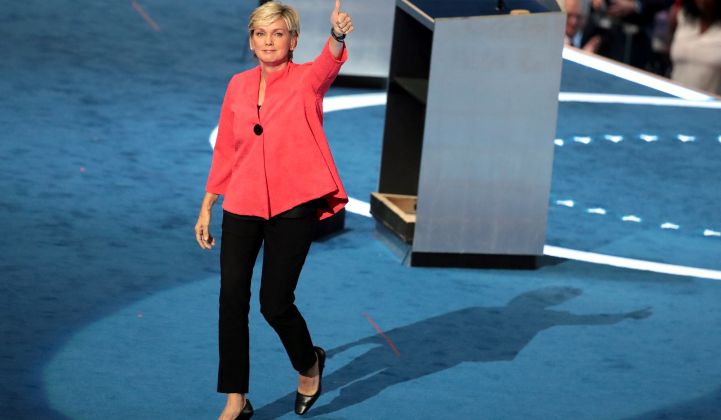In a Wednesday Senate hearing, former Michigan Governor Jennifer Granholm echoed previous commitments to create clean energy jobs and focus on U.S.-made equipment if confirmed as U.S. Energy Secretary.
Beyond helping carry out President Biden’s target of 100 percent clean electricity by 2035, the Energy Secretary oversees 17 national labs and manages the U.S.’ nuclear capabilities and cleanup efforts. Despite Biden’s grand clean-energy ambitions, the latter responsibilities make up most of the department’s current budget.
Granholm’s confirmation hearing, however, largely focused on how the Biden administration will carry out its energy targets. On Wednesday Biden signed several climate-focused executive orders that direct federal agencies to buy carbon-free electricity and start U.S. goal-setting for emissions reductions under the Paris climate agreement, among other measures.
Granholm, who as governor helped steer Michigan and its auto industry through the financial crisis of the late aughts, has centered her nomination around clean-energy employment and manufacturing in support of the Biden-Harris administration’s wide-reaching climate goals.
“I believe that I was nominated by the president because I am obsessed with creating good-paying jobs in America,” Granholm said in testimony at the hearing. “Having been the governor of Michigan when the automotive industry was on its knees, I understand what it’s like to look in the eyes of men and women who have lost jobs through no fault of their own.”
“The experience I had in Michigan seared my soul on behalf of workers,” Granholm said later in the hearing, discussing the anxiety associated with job losses in legacy energy industries.
Prior to the coronavirus pandemic, 3.4 million Americans worked in clean energy industries including energy efficiency, more than triple the number that worked in fossil fuels, according to Environmental Entrepreneurs, an organization that tracks clean-energy employment.
Fossil fuel jobs issues take center stage
Despite those job numbers, senators from fossil-fuel-reliant states posed many questions about how the administration’s plans to move away from fossil fuels would impact jobs and state economies, making the issue a central theme of the hearing.
“I hope you appreciate and understand the anxiety in families and the anxiety in communities and in whole states,” said Republican Sen. Lisa Murkowski of Alaska, a state highly dependent on oil revenue.
“What they don’t want is to throw them a life preserver that’s weighted down with an anchor when they’re trying to survive. That’s what they think has been thrown to them in previous administrations,” added Sen. Joe Manchin, West Virginia Democrat and chair of the Senate Energy and Natural Resources Committee. Manchin also noted the continued coal job losses during the Trump administration, despite the former president’s repeated promises to revive the industry.
Scientists have set 2050 as the year when the world needs to reach net-zero emissions to keep warming below 1.5 degrees Celsius and avoid the most horrific impacts of climate change. President Biden has pledged to create 10 million jobs in clean energy in support of a goal to get the U.S. to net-zero emissions by midcentury.
In a suite of executive orders on climate-change mitigation signed Wednesday, the Biden-Harris administration set out “Made in America” requirements for federal clean-energy purchases and called for the establishment of a Civilian Climate Corps Initiative. The new administration has sought to tie its climate-related actions to job growth, decoupling climate action from the economic anxiety described by some lawmakers.
“Today is climate day at the White House, which means today is jobs day at the White House,” Biden said in a Wednesday address.
Though both Biden and Granholm have committed to transitioning workers away from jobs that could become obsolete as clean energy accounts for a growing share of electricity production, some lawmakers, including Manchin, a self-described "moderate conservative Democrat" who could decide the fate of future climate legislation in a Senate narrowly controlled by that party, expressed concern on Wednesday about the future of legacy industries. Another executive order signed Wednesday paused new oil and gas leases on public land “to the extent possible.”
In her confirmation hearing, Granholm attempted to assuage that anxiety, leaving the door open to fossil fuels while boosting the administration’s plans to move toward clean energy and green jobs. Granholm noted that Wednesday’s order impacts only future oil and gas leases and suggested that coal, oil, gas and carbon-capture technologies must be “part of the mix” in a transition to net-zero carbon emissions by midcentury. The nominee also said the U.S. could continue to export natural gas to other countries while working with producers to reduce emissions “at the point of production.”
“The president’s plan of building back better…would create more jobs in clean energy than the jobs that might be sacrificed. But I will say this: We don’t want to see any jobs sacrificed,” said Granholm. “This is something we’re going to have to work on together to make sure that people remain employed.”
The pause on oil and gas leases, Granholm added, “gives us some time to be able to work on creating jobs and diversifying and providing good-paying jobs in every pocket of the country.”
David G. Huizenga, a DOE employee since 1987, is running the Department of Energy while Granholm awaits a confirmation vote in the Senate.




